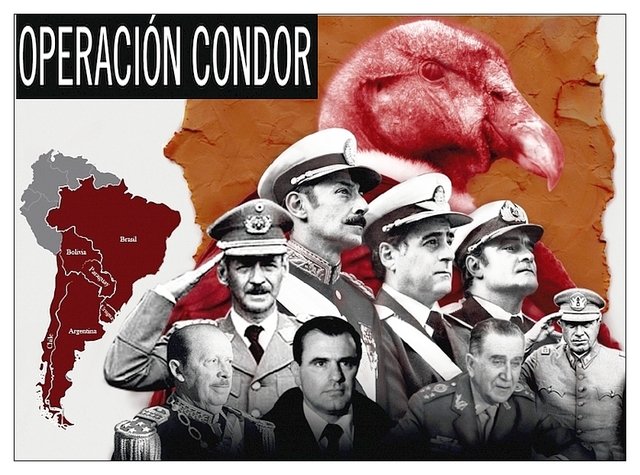In the third article about the CAMeNA history archive in Mexico (you can read the first here, and second here), Cornelia Gräbner focuses on the life of Idalina Tatter, a Paraguayan whose husband, Federico Jorge Tatter, was detained in Argentina and ‘rendered’ back to Paraguay by agents of Operación Condor.
‘Idalina could analyse situations very rapidly. She was very quick, very intuitive, very practical, and very mistrustful. Rarely did she believe what people first told her. And she would draw on certain diplomatic techniques, of non-confrontation.’ This is how Federico Tatter characterizes the activism of his mother, Idalina Rádice de Tatter. ‘Until 1976 I knew her mostly in her role as my mother’, Federico remembers, ‘Then, when my father was forcibly disappeared, she told me that she was going to dedicate all her efforts to finding him. And she pleaded with me to leave the country.’
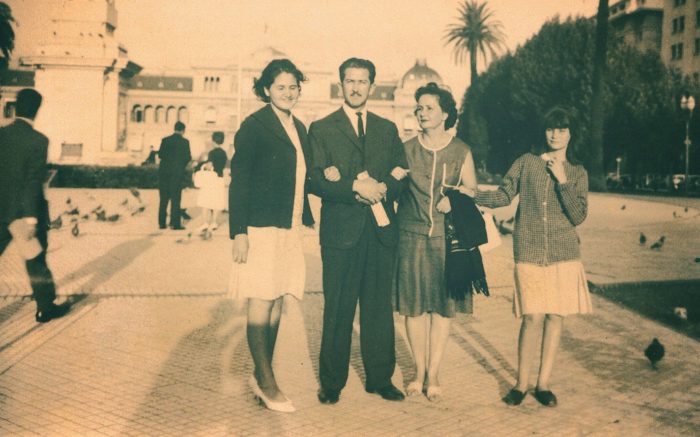
By this time, in October 1976, Idalina has behind her a long history of political organization and exile. Her husband, Federico Jorge Tatter, is a former naval officer and political activist from Paraguay. Idalina and Federico Jorge meet in 1947 in Asunción, and get married in 1948. It is the time known as the ‘Democratic Spring’. Idalina is a schoolteacher and is active in the teachers’ union, while Jorge Federico studies at a politicized Military Academy.
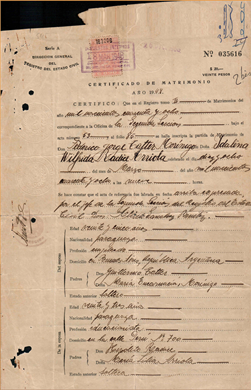
Idalina and Jorge are communists, socialists, anti-imperialists, nationalists in the sense that they reject foreign interventions and emphasize the right to self-determination, and they are passionate organizers for democracy and social justice.
But the situation in Paraguay deteriorates into Civil War, the revolutionary movements in which they are involved are repressed, and the Democratic Spring ends. Like many of their compatriots, Idalina and Jorge Federico are forced to go into exile, to Argentina and Uruguay.
From Paraguay to Argentina
Over the next decades Idalina and Jorge have three children and continue their political work, sometimes in clandestinity.
In 1952 they return to Paraguay. In 1954, General Stroessner takes power through a coup d’etat. In 1963 Federico Jorge is arrested and tortured.
They escape to Argentina. There, they set up a small business and organize among Paraguayan, working class, Guarani-speaking migrants living in shanty towns, for the formation of neighbourhood committees, community activism, and the creation of a social fabric. Federico Jorge is bilingual in Spanish and Guarani, and he communicates across class and ethnic boundaries.
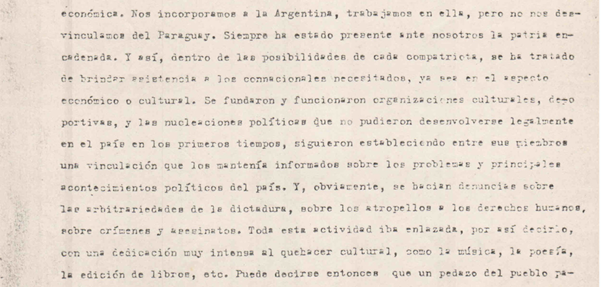
The Argentine army carries out a coup d’etat in March 1976. Six months later, in October, six armed men dressed as civilians forcibly enter the family home in Buenos Aires and take Federico Jorge with them.
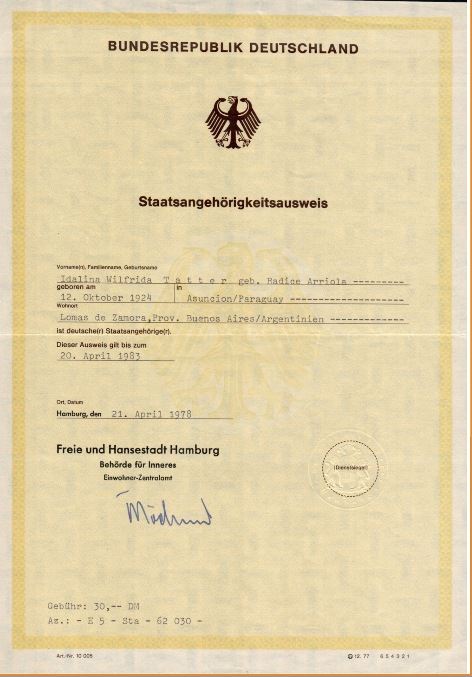
Idalina does not lose a moment. Unlike the families of many other victims of forced disappearance, she recognizes straight away that the State is responsible for her husband’s abduction, and she knows the strength of her opponent. She immediately starts filing one habeas corpus after another, uses the term ‘detenido-desaparecido’, contacts anyone she can think of who might help her find her husband, and seeks out other families in the same situation.
Jorge and Idalina are both of German descent, so they are entitled to apply for German citizenship for themselves and their children. A sympathetic consul processes Idalina’s application as an emergency, and the request is granted.
Jorge Federico is now the responsibility of the German government and no longer a citizen of the totalitarian Stroessner State. Idalina can travel abroad to advocate for her husband; Federico can no longer be forced into military service in Paraguay, and he can leave the country for a safe haven in Mexico.
The search for the disappeared
Idalina throws herself into the search for Federico Jorge and into creating a collective organisation of the family members. She is an exception among them. Few know how to take on the State and deal with political repression. Idalina, in contrast, has the experience of a trade unionist, the analytical clarity of a political activist, and the skills and confidence of a trained teacher.
She knows how to deal with the authorities, how to express herself in writing and in speech, has a lucid political analysis of the situation, is psychologically resilient and, through her professional training, her personality and her organizational experience, knows how to communicate and interact with people from vastly different backgrounds.
One of the organizations she helps to build will eventually be known as the ‘Mothers of the Plaza de Mayo.’ Idalina also co-founds two other organisations, those of family members of Germans and Paraguayans who are detained and disappeared in Argentina.
United by the experience of suffering, family members from all sectors of society work together to support each other, pressure governments, build coalitions, create international awareness, eventually initiate and campaign for trials, and persuade foreign governments to cease all support for the military Junta and stand by the forcibly disappeared and their families instead. Over the years, they discover dispersed, hidden elements of the full truth and put them together.
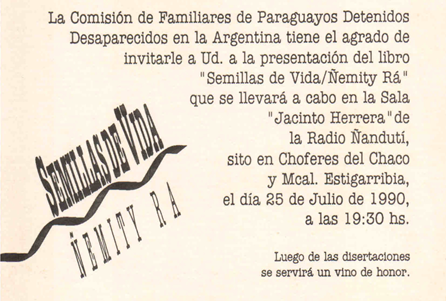
Idalina and her comrades know from experience that the repression crosses borders. Paraguayans, Argentines, Uruguayans, Bolivians, Chileans are forcibly disappeared in exile – as part of what we now know was Operación Condor. This is a secret collaboration among at least eight countries in the Southern Cone, to track exiled dissidents and return them to their home country. In 1992, part of the archive of the Paraguayan security services is discovered in Asunción. Although the material held in the archive is partial and incomplete, it contains proofs that Federico Jorge was taken to Paraguay after his arrest in Argentina.
Court cases are another way of forcing the agents and accomplices of repression to hand over the evidence in their possession concerning the fate of their victims. Idalina tries several times. Supported by the Association of Republican Lawyers and the Coalition Against Impunity, she takes her husband’s case to the German courts. But the period set by the statute of limitation has expired, and the case is thrown out.
Together with other members of the Commission of the Detained-Disappeared of German Origin in Argentina, they initiate further court cases. In Argentina, several high-profile trials take place throughout the 2000s, among them one involving some of those who implemented the Operación Condor. But Idalina does not live to testify at it.
Idalina forms profound friendships and deep connections during her years of searching and transnational organizing. She eventually moves to Asuncion, where her children live, and where she remains active in the Commission of Family Members of the Forcibly Disappeared in Paraguay. She dies in 2003. Federico, her son, takes on the baton, continues the search for his father, and acts as a witness in the upcoming trials.
The relentless persecution that the Stroessner-Regime unleashed upon its opponents, and the complicity of other states with state terrorism, is one of the least investigated crimes in Latin America. Idalina’s personal archive is an important source of knowledge about the equally relentless resistance of Paraguayans, about their tireless organising for truth and all forms of justice.
Many questions remain. The Archivo del Terror Operación Cóndor en el Archivo del Terror (gwu.edu) is not easily accessible, materials are not easy to locate. There are questions about the scale of its incompleteness and the whereabouts of the missing documents. Idalina and Federico Jorge’s surviving children, María Magdalena and Federico, donated digital versions of their mother’s archive available to the CAMeNA. It tells a story of love and perseverance, of international solidarity and transnational organising in the face of transnational persecution and state terrorism.
The author would like to thank Federico Tatter Rádice and Cristina Jiménez Calero (CAMeNA).

